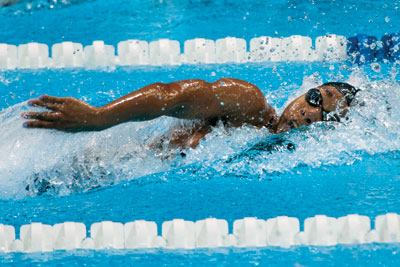By the time you read this, I know some of your excitement about the 2012 Olympic Games may have fizzled out. But not for me!
2012 was a monumental year for swimming at the London Olympic Games and I would be seriously remiss if I didn’t point out the impact it had on the minority community. Yes, most headlines went to the amazing Michael Phelps, who broke and set a new record for the most Olympic medals won by an athlete.
But in the minority community, the real news was that for the first time in history, the United States Olympic Team boasted not one, not two, but three swimmers of African-American descent! When news broke of the team selections following the Olympic Trials in June, I was overcome with excitement and could not wait to watch the Olympic Games. Cullen Jones, Lia Neal and Anthony Ervin — not just ordinary members of the U.S. Olympic Team, but extraordinary trailblazers, history-makers and role models for young swimmers from diverse backgrounds.
From day one, I sat glued to my couch watching and waiting to see our team compete. I don’t ever remember being so intent on watching all of the swimming events, as I was this year! I know I am passionate about swimming and increasing minority participation, but I had no idea the emotions I would feel seeing Lia Neal lead off the women’s 4 x 100-meter relay during the semi-finals. Not only did I feel my eyes well up, but I also had to explain to my family why I was jumping up and down, cheering at the television like I was sitting front row at the London Aquatics Centre. If you can’t tell, I was a little excited, to say the least. Though the women’s relay team did not take home gold, they did win bronze and set an American record for which we can all be proud. Our men’s relay team also performed very well, winning silver in the 4 x 100-meter race. Cullen and his teammates swam their hearts out, and I was so proud of how well Cullen performed as part of this medal-winning team.
Cullen Jones and Anthony Ervin’s battle to the very end of the swimming events in the 50-meter freestyle event had me so anxious at work that I had a hard time focusing. That day, I avoided watching the news and the Internet (Facebook, CNN, NBC and the like) to prevent any midday spoiler alerts because I wanted to see and experience this race with my own eyes later that evening.
Cullen had already won silver as part of the U.S. relay team, but I so wanted to see him or Anthony take home gold in the 50-meter “Splash and Dash” event. That evening, as I watched them walk to the starting blocks prior to their races, all I could think about was how exciting it would be to see them both on the medal stand by the end of the night. Though Cullen was the only swimmer to place with a silver medal, I remained enthusiastic and proud of both of their performances and for providing a much- needed example of diversity within competitive swimming. I tip my swim cap to Cullen, Anthony and Lia! Thank you for making us all proud!
These are the role models our minority communities need to see and emulate. These are the athletes who worked hard, trained hard and won hard at the 2012 Olympic Games. Yes, Michael Phelps and Ryan Lochte are the more decorated athletes in terms of wins and medals. However, Cullen Jones, Lia Neal and Anthony Ervin represent the biggest win in being able to promote increased diversity on the United States Olympic Team and throughout this year’s competition.
How can you, as an aquatics professional, help promote the accomplishments of minority swimmers? It doesn’t take much. You can have your instructors incorporate a short story or bio about the athletes during the start of your swim lessons; you can put up a bulletin board highlighting their achievements at your facility; or you can include information about these swimmers on your Web site, community newsletters and during events. Every little bit helps increase awareness and creates connections to these athletes within your community. You never know who this information will inspire to be the next Olympic athletes!
Improving minority participation in aquatics is not just an urban issue — it is a national issue. As aquatics professionals, we have the power and resources to reduce these statistics … one lap at a time!



